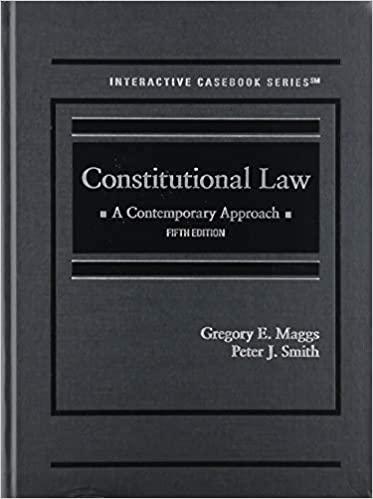Question
In this case, a 22-year-old male patient was brought to the hospital after a car accident and he was suffering from a brain injury. This
In this case, a 22-year-old male patient was brought to the hospital after a car accident and he was suffering from a brain injury. This patient needed an operation in order to save his life, as the doctors determined that this patient would die if he does not receive this operation. This operation would require blood transfusions to make sure that he stays alive during the operation. The patient's parents would not consent to the blood transfusions due to their religious beliefs. In this situation, the man was not able to give consent to the operation as he was unconscious, but it was an emergency situation and without the operation he was going to die. The parents of the patient became the next-of-kin in this situation and they did not consent to the blood transfusions.
When the parents did not consent to the transfusion due to religious beliefs, the doctors and the hospital reached out to the court system to receive temporary guardianship so they could perform this operation. The hospital was thinking of their right to provide life-saving care to this patient, knowing that if they do not complete this operation, their patient would die. The parents on the other hand, feel as if they had their religious beliefs violated by their son being forced into receiving these blood transfusions. If the patient would have been able to speak for himself, then this would have been avoided because he could have personally either given his consent or withheld his consent.
The administrators should take this situation and use it to learn from. While the courts may have sided with them, they violated the religious beliefs of their patient and the patient's family. This could be a problem for future patients, they may not want to come to this hospital in fear that they might have their beliefs violated. The hospital did not want to have a patient die when they believed that this procedure would save the life of this patient. Religious beliefs are extremely sensitive and they should be taken seriously, obviously it is an extremely hard situation with a dying patient who is very young. This patient would have a long life ahead of him if he has this operation, the administration was probably thinking that this young man would want to continue to live so they fought to have this procedure allowed. There would need to be some written type of consent to make sure that something like this does not happen.
(READ THE ABOVE and ANSWER THE QUESTIONS BELOW)
Take on one identity of a healthcare professional on an ethics committee. Choose one party in the case.
Critique and refute the defending argument.
Make a recommendation on the case as the healthcare professional's role you have taken serving on the ethics committee.
Which ideas or thoughts did you read that you found interesting or insightful? How did these ideas or thoughts inform your own thinking?
Step by Step Solution
There are 3 Steps involved in it
Step: 1

Get Instant Access to Expert-Tailored Solutions
See step-by-step solutions with expert insights and AI powered tools for academic success
Step: 2

Step: 3

Ace Your Homework with AI
Get the answers you need in no time with our AI-driven, step-by-step assistance
Get Started


